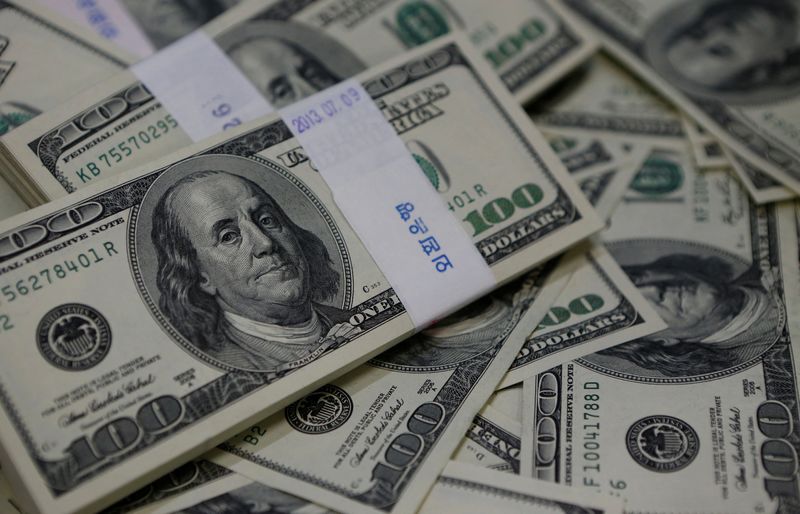A look at the day ahead in U.S. and global markets from Mike Dolan
U.S. Treasury yields slipped back on Monday after Wall Street money manager Scott Bessent got the nod to be the next Treasury Secretary, with markets hoping his take on tax cuts and tariffs may at least be sensitive to edgy investor concerns.
Ahead of the Thanksgiving holiday week, President-elect Donald Trump ended intense speculation over the Treasury pick late on Friday and put Bessent forward for the job.
While in favor of extending 2017's tax cuts, more tax reform and deregulation, Bessent has been vocal about fiscal control, sees tariff threats mostly as a negotiating tool and supports the dollar's dominant reserve currency status.
In an interview with the Wall Street Journal published on Sunday, Bessent said measures would include making Trump's first term tax cuts permanent, as well as eliminating taxes on tips, social-security benefits and overtime pay.
Perhaps the biggest relief in debt markets was that his experience as a Wall Street trader would influence his calibration of all those policies if markets got restive.
Although he has backed away from the idea since, Bessent did recently advocate undermining the authority of Federal Reserve chair Jerome Powell by nominating Powell's successor early and effectively creating a "shadow" Fed boss.
The upshot on Monday, however, was that 10-year and 30-year Treasury yields fell almost 10 basis points from Friday's close to as low as 4.32% and 4.51% respectively before steadying.
The drop in yields, along with hopes for a more tempered approach to tariff hikes from the administration at large, saw the dollar retreat, and stock index futures extended Friday's rally ahead of the Monday's bell.
The dollar index fell back from Friday's two-year highs, with the euro recovering ground from its sharp plunge late last week.
With speculation that China would remain the focus for any U.S. tariff hike campaign - and proposed universal tariff rises more nuanced - European and Japanese stocks advanced while Chinese mainland and Hong Kong benchmarks fell again on Monday.
Whatever happens under Trump, pressure on China is intense already. The outgoing Joe Biden administration is set to unveil new export restrictions on China this week, the U.S. Chamber of Commerce told members.
New regulations could add up to 200 Chinese chip companies to a trade restriction list that bars most U.S. suppliers from shipping goods to the targeted firms, an email from the powerful Washington-based lobbying group said.
In Europe, rising economic, trade and geopolitical worries were underscored by the Ifo institute's latest German business survey - which showed morale fell more than expected in November.
Last week's divergence in euro zone business surveys showing fresh contraction and another robust U.S. reading were stark.
Pressure on the European Central Bank to keep easing monetary policy is building and has kept alive hopes of a rate cut of up to 50bps at next month's final policy meeting of the year.
Although ECB chief economist Philip Lane said there was still a way to go to ensure inflation is sustainably back at target, he warned of the dangers of overly tight interest rates.
"Monetary policy should not remain restrictive for too long," French newspaper Les Echos quoted Lane as saying on Monday. "Otherwise, the economy will not grow sufficiently and inflation will, I believe, fall below the target."
The pressure on European central banks more broadly was spotlighted on Friday when Swiss National Bank boss Martin Schlegel opened up the possibility of a return to negative interest rates if necessary.
"Nobody loves negative interest rates, the SNB does not love negative interest rates, but if it is necessary we are ready to take the next step," he said.
Back stateside, the strong readings from flash November business surveys and creeping long-term inflation expectations in the University of Michigan's latest household survey saw Fed rate cut bets slip back further. Only two quarter point cuts are now fully priced in futures markets over the coming year.
Wednesday's release of the October Personal Consumption Expenditures inflation reading - the Fed's favored gauge - tops the week's data releases ahead of Thursday's holiday.
In deals news, Italy's UniCredit dropped 2% on Monday after launching a surprise all-share offer worth 10 billion euros ($10.45 billion) for smaller domestic rival Banco BPM which was up 5%.
Commerzbank (ETR:CBKG) fell 6% as investors assessed the offer's impact on Unicredit (BIT:CRDI)'s likely buyout of the German lender.
Shares in British broadcaster ITV (LON:ITV) jumped 9% on media reports that it could be a takeover target for a team led by CVC Capital Partners (WA:CPAP).
Key developments that should provide more direction to U.S. markets later on Monday:
* Dallas Federal Reserve November business survey, Chicago Federal Reserve October national business survey
* European Central Bank Chief Economist Philip Lane and Ireland's central bank chief Gabriel Makhlouf speak
* US corporate earnings: Agilent Technologies (NYSE:A)

* US Treasury sells $69 billion of 2-year notes
* G7 foreign ministers meet in Fiuggi, Italy
(By Mike Dolan, Editing by Ed Osmond; mike.dolan@thomsonreuters.com)